The first page opened with an article titled "THE INDIAN TRAINING SCHOOL," that described the progress of the school, its Christian methods, the work of the former Ft. Marion prisoners of war preparing buildings for use, the importance of the town Sunday Schools, the school curriculum that emphasized farmwork for boys and housekeeping for girls…
Religious Activities at the School
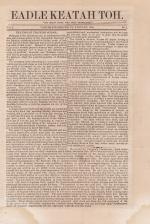
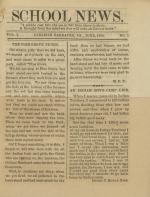
The first article by M. D. P. [Mason D. Pratt] describes a field trip to an iron forge near Pine Grove, followed by a picnic at the grove with the students, teachers, visiting chiefs, the college band and some invited guests. “An Indian Boy's Camp Life,” by Henry C. Roman Nose, gives a short account of his activities growing up. An "Editorial"…
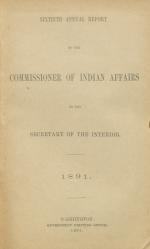
An excerpt from the Annual Report of the Commissioner of Indian Affairs to the Secretary of the Interior for the fiscal year ending 1891, containing the Twelfth Annual Report of the Carlisle Indian Industrial School. The report, submitted by Superintendent Richard Henry Pratt, includes a table of the school's population, as well as discussions…
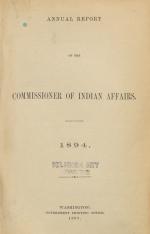
An excerpt from the Annual Report of the Commissioner of Indian Affairs to the Secretary of the Interior for the fiscal year ending 1894, containing the Fifteenth Annual Report of the Carlisle Indian Industrial School. The report, submitted by Superintendent Richard Henry Pratt, includes a table of the school's population, as well as…
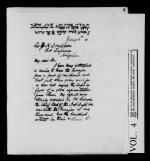
Letter from Pratt to Rev. A. H. Donaldson at Fort Defiance, Arizona, stating that he welcomes Navajo students at the school. He describes the religious affiliations of the staff and the role of religion at the school.
This material is from the Richard Henry Pratt papers, donated by his family to Yale University in 1959 and 1976.…
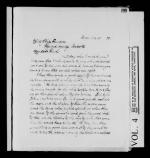
Richard Henry Pratt writes to Chief White Thunder about the funeral ceremony and burial of his son, Ernest. Pratt expresses his sorrow and sympathy at White Thunder's loss, but also argues that White Thunder was right to send Ernest to the school.
Pratt notes that Maud (Little Girl) died the same night as Ernest, so they were…
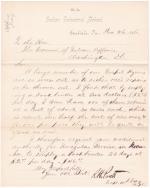
Richard Henry Pratt requests authority to employ a bookbinder to repair 150 worn out gospel hymnals.
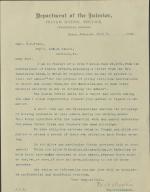
W. B. Backus, Superintendent of the Genoa Indian School, writes to Richard Henry Pratt for advice regarding on-campus religious services and whether they are allowed at Carlisle.
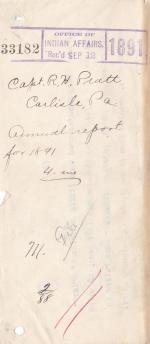
Pratt's annual report of the Carlisle Indian School begins by providing statistics of the number of students from various nations during the school year. Pratt claims that the per capita cost at Carlisle is lesser than at other schools while also highlighting the cost of Carlisle as a tool for greater assimilation with the outing program in…
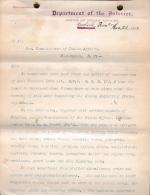
Charles H. Thompson forwards an inspection report of the Carlisle Indian School on March 2, 1892. Thompson's report examines a wide range of topics related to the school including the buildings, health of students, food, student's social lives, industrial training, outings, and academic training.
Thompson also includes a number of…
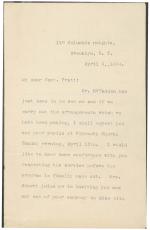
Rev. Lyman Abbott writes to Richard Henry Pratt requesting a dinner meeting before a visit by Carlisle students to Plymouth Church.
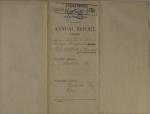
Fifteenth Annual Report of the Carlisle Indian School for the 1893-1894 school year. Richard Henry Pratt provides an overview of the previous year focusing on both the academic and industrial training as well as the outing program. In addition, Pratt focuses on the Chicago World's Fair and Columbian Exposition which the School had an exhibit…
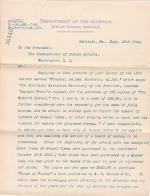
Richard Henry Pratt responds to an Office of Indian Affairs letter by providing the number of Gospel Hymns currently at the Carlisle Indian School and indicating the need to purchase new hymnals.
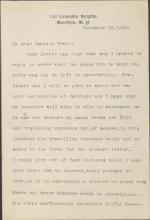
Rev. Lyman Abbott writes to Richard Henry Pratt listing prices and topics for a lecture he can give during a visit to Carlisle.
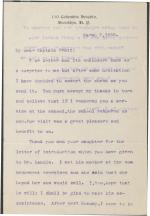
Rev. Lyman Abbott writes to thank Richard Henry Pratt for payment for his visit and lecture at Carlisle, and acknowledges a letter of itnroduction Pratt provided for a Mr. Landis.
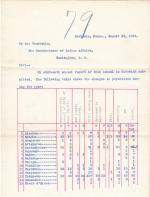
Sixteenth Annual Report for the Carlisle Indian School covering the 1894-1895 school year. The report begins with changes in enrollment of the various nations. Richard Henry Pratt continues with his overall philosophy of educating Indian students including speaking English, industrial training, civilization, and then academic training. And then…
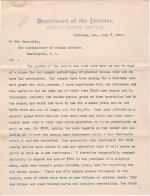
Richard Henry Pratt informs the Office of Indian Affairs of the new for a new piano at the school's chapel gatherings. Pratt notes that he has negotiated with the Steinway company for a used piano for $700 as well as repairing their other pianos for an additional $100.
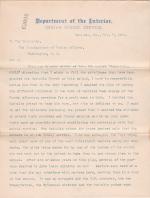
Richard Henry Pratt replies to an Office of Indian Affairs letter regarding the privileges that have been granted the Catholic Church at the Carlisle Indian School. Pratt further details the history of interactions between the School and the various religious denominations in Carlisle.
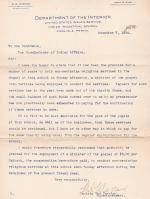
William A. Mercer requests authority to continue through the appropriation the non-sectarian services at the Carlisle Indian School.
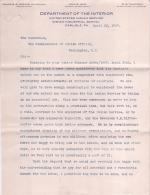
William A. Mercer responds to an Office of Indian Affairs letter regarding the work of the Industrial Department. Mercer outlines the work done for Reverend G. M. Diffenderfer was done due to a lack of regular work and in no way is meant to compete with local industries.
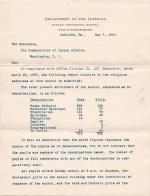
J. R. Wise provides a report on the religious exercises at the Carlisle Indian School. Also included is sheet music for Grace Before Meals which were written for the School.
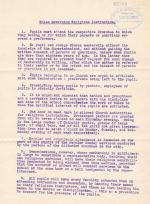
Chief of the Education Division J. H. Dortch informs Carlisle Indian School Superintendent Moses Friedman that almost every Indian school but Carlisle has had a hard time balancing Christian religious instruction with academics without angering any denomination. Because of this, Dortch would like to base the policies for the rest of the Indian…
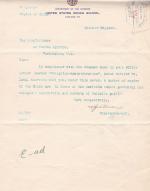
This document contains correspondence concerning the religious instructions and worship for Catholic pupils. Topics include mandatory and optional devotions, holiday activities, and ceremonies for sick and dead students.
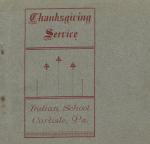
Thanksgiving Service booklet with printed songs, readings and prayers, printed at the Carlisle Indian School Print Shop.
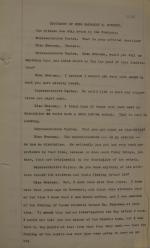
The typed transcript of Margaret M. Sweeney's testimony before the Joint Commission to Investigate Indian Affairs. At the time Sweeney was a teacher at the school.
In her testimony Sweeney expresses her opinion that Superintendent Friedman is unfit to lead the school and explains circumstances where she believes he discriminated against…
